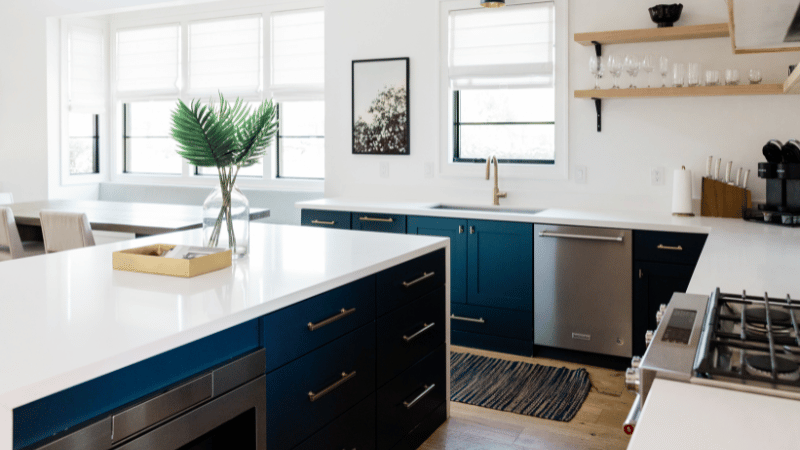Categories
How to Successfully Flip a House

The housing market offers many opportunities for profit.
Alongside the long-term plan of investing in a property to rent out and eventually sell on many years later, is the short-term business strategy of buy-renovate-resell - taking a property that’s priced low because it’s in need of renovation, restoring it to a desirable home, and then selling it on for a far higher price now that it’s desirable.
Known as ‘house flipping’, this model provides investors an engaging way to make a rapid return on investment.
At Clifton Private Finance we’ve got the financial know-how that you need to make sure your house-flipping experience is a positive one, with profits high and costs low.
The Basics of House Flipping
The core structure of house flipping involves:
- Buying an Undervalued Property - As house flipping is all about maximising profit, it’s important to get the property for as cheaply as possible. Often this involves getting property at auction, as this is where the majority of renovation project properties are sold.
- Rapid Renovation - Fixing and upgrading the property is a key part of the project, so you are looking to get a house in a poor condition from which you can restore it to full glory, taking into account your budget and skills. Time is often a factor in house flipping, so you should plan to renovate and refurbish as quickly as possible.
- Resell at a High Price - For the maximum profit, it’s obviously important to get as much as possible when you resell the house.
House flipping is a fast-paced and appealing venture, with the opportunity to make a sizeable amount of money - but it’s also risky. Success comes from being properly planned, appropriately funded, and with the ability to get everything done in the desired timeframe.
Who is House Flipping For?
House flipping has some strange myths surrounding it. Some people believe it can only be done by large property companies with dedicated internal teams for each stage of the project, while others take the opposite stance and believe house flipping is easy, that you can buy a rundown house in auction for a few thousand pounds and turn it into a half-million house in a few months with a bit of painting and decorating - neither is true.
You will need professional support, especially when obtaining finance, to ensure that costs don’t spiral out of control and turn a fun dream into a terrible nightmare.
If you are looking to take on a house renovation and flipping project for the first time, ask yourself:
- Do I have the project management skills to see a potentially complicated project through from start to finish?
- Do I have some contacts in the trades to know who to partner with to get the work done professionally and on schedule?
- Do I have some money of my own I am willing to risk in this investment?
- Do I have a financial partner with the calibre and understanding to provide short-term funding solutions at low cost to maximise profit? - You do with Clifton Private Finance.
With realistic expectations, a confident and professional outlook, and Clifton Private Finance by your side, you can look forward to an enjoyable and profitable house flipping undertaking.
The House Flipping Timeline
A typical house-flipping project has a distinct timeline as follows:

Step 1 - Initial Research
It’s essential that you don’t just jump into a house-flipping project without proper research and understanding of the market. The first step is always to choose an area and the type of property you feel comfortable and capable in renovating.
It is easy to come unstuck assuming that people are looking for clean and modern homes that meet current market trends, only to find too late that the enthusiasm in the local area for such designs is low, and there is a greater market for homes with a different aesthetic - for example, a more rustic, country feel. Make sure your planned renovation meets the market expectations.

Step 2 - Financing
You'll need to finance your project unless you have the cash on hand to buy outright.
Get in touch with us before bidding at auction for the property - it’s essential that you can follow through with your bid with the full financing (often within 28 days) or you could lose your deposit. If you are serious about flipping houses, then you need to get everything put in place before driving forward.
Remember that the deposit on the property is not the only outgoing. Surveys and legal fees will also form part of your early budget, so be sure to have the funds allocated appropriately.
Short- and mid-term financing can be included in your financial planning to provide early liquidity, or additional costs can be factored and folded into a main bridging finance solution.
By engaging with our specialist team early, you can ensure that everything is put into place in a timely fashion to avoid delays and potential extra costs.
Get a Quote
Get started with our calculator

Step 3 - Purchase the Property
With the finance ready to go, purchasing the property is swift and effortless. Auction properties typically require a deposit to secure the property, with full payment due in 28 days.
By focusing your funding solution on bridging finance, you ensure that this timeline is easily achievable, giving you the confidence needed to immediately sign the contract.
Once completed, the property is yours and work can begin.
Step 4 - Renovation
The renovation stage is a key time for funding. Development finance solutions are often staged to minimise the amount of interest generated, keeping the costs low. A thorough project management plan is essential to budget and determine the schedule of works.
When renovating a property to flip, it is important to focus on added value, not perfection - remember, you’re undergoing a business project to maximise the return, not designing your dream home.
- Having Clifton Private Finance by your side will help throughout the renovation stage of the project. Upgrading a house is not always as simple as it may first seem and problems do occur along the way. Having a confident financial partner who can adapt on the fly to ensure that the money doesn’t run out when it is most needed, and to help you objectively assess your options should more funding be needed, will help you keep the project in budget and ultimately profitable.

Step 5 - Sale and Profit
The final stage, when the property is brought up to standard, is to sell it on and make that all-important profit. Remember, you are still paying interest on your bridging finance at this point, so optimising your sales strategy to sell quickly is vital.
If you choose to retain the property and move to a letting strategy, you will need a buy-to-let mortgage to replace the bridging loan. Our mortgage team will be on hand to help you develop a landlord-oriented business plan, find suitable lenders and get you a cost-effective mortgage that meets your needs.
Congratulations - you have successfully flipped a house.
Budgeting
Budgeting makes all the difference between a successful and profitable house-flipping project, and one that becomes a heavy weight around your shoulders with spiralling costs and potential losses.
From the very early stages, it is essential that you plan and budget accordingly. Consider all of the following when developing your initial financial plan:
- The cost of purchase - Beyond the property itself, you will need to consider Stamp Duty Land Tax (SDLT) or the equivalent land taxes in Scotland or Wales, plus the legal fees for contracts and conveyancing.
- Surveys and reports - When you are buying for renovation, a low-cost homebuyers survey is rarely the right choice. Plan for a comprehensive survey that delves into the finer details of the property. While it may cost more in the beginning, it can stop you from losing thousands later on in the project.
- The renovation - It sounds obvious, but once you have the survey in hand, consider every room and the renovation you will need to do there. Don’t forget the cost of landscaping or other external considerations.
- Running costs - Once you have the building and are working on it, there will be associated costs while the renovations take place. Electricity, council tax, water, and insurance are all considerations that will impact your budget.
- Sales fees - You will need to evaluate local estate agents and account for their fees. As you are looking for a rapid sale, explore the efficiency of different estate agents and allocate money for their costs accordingly.
- Taxes - Capital Gains Tax (CGT) will have a great impact and must be planned for. VAT may also be relevant, especially if you are structured as a business and able to offset the cost of VAT in your outgoings.
- Contingency - Even with the best planning in the world, there needs to be room for movement. Always build in a contingency of between 10% and 20% to deal with unexpected situations.
- The cost of finance - At Clifton Private Finance we will work closely with you to make sure the finance is as cost-effective as possible, but there are fees and interest to be paid. It is important that you calculate your budget with those in mind and set up the necessary space in your cash flow to make payments during the project to minimise the impact of interest with bridging finance.
Project management and budgeting should include detailed financial tracking, with your spending noted daily to keep on top of the costs.
Why Bridging Finance and Not Mortgages for Flipping Houses
Throughout this article, we have spoken about bridging finance and not mortgages as the primary funding solution - why is that? What are the differences between bridging finance solutions and traditional mortgages?
Some of the differences between bridging finance and mortgages are:
- Different risk vs. reward profile - Bridging finance is higher risk, with less stringent requirements on the property used as security and no long-term affordability testing.
- Bridging finance is fast access to funds - Rather than taking weeks or months to reach a decision, bridging finance providers work on a timescale of a few days or even hours.
- Higher interest - The downside to bridging finances is that it is more expensive than a mortgage. Interest rates are higher and must be factored into the financial strategy and expected profit for the project. Working with Clifton Private Finance ensures that you have access to the most competitive bridging finance interest rates and the support needed to reach your exit point as soon as possible.
- Repayment is based on an exit strategy - Rather than long-term finance with regular monthly repayments for many years, bridging finance expect to be repaid in full after a short time, either through the sale of the property or by being replaced by longer-term financing (such as the mortgage).
- Not tied to your credit or salary - Bridging finance is assessed on the property as security with far less consideration to your credit score or affordability.
- Good for non-mortgageable properties - The long-term risk assessment of a mortgage means that uninhabitable properties are considered ‘unmortgageable’, making them totally unsuitable for house flipping projects where the entire idea is to buy one of these uninhabitable properties and turn them into valuable homes. Bridging finance does not suffer this key limitation.
- No early repayment charges - Because bridging finance is short term and designed to be paid back as quickly as possible, there are no fees for repaying the loan.
- Staged payments - Keeping interest under control is a key consideration with bridging finance. For that reason, many bridging loans are staged, with the money being released when it is needed rather than the full lump sum being provided at the start of the project only to sit in a bank account costing you money while the work is done.
Bridging finance provides flexibility that mortgages simply cannot deliver. It is the best funding solution to give you a house flipping opportunity, tailored to meet your specific requirements.
Learn more with our full guide to bridging loans.
Insurance
Insurance is a key part of any renovations project. Making sure you have the financial security if something goes wrong is important - especially when funding is secured on the property. Many lenders will insist on different insurances to lower risk.
Insurances include:
- Unoccupied property insurance - This protects your building if it is left vacant for more than 30 days, as is likely to happen during a renovations project.
- Renovation insurance - Renovation insurance covers you if things go wrong while you are doing the work on your property. It is a vital insurance to give you the peace of mind needed to do the renovations without worrying about potential disasters.
- Structural warranty insurance - Providing a financial safety net for the years after any structural changes have been done, structural warranty insurance reassures buyers and mortgage lenders, creating confidence that will make your flipped house easier to sell.
- Life insurance - While not directly tied to the property, life insurance that will cover the bridging finance should the very worst happen will allow your family to benefit from your investment without worrying about having to sell the property half-renovated to cover the loan during a period of distress and grief.
Taking out the appropriate insurance will give everyone confidence - yourself, your family, and the lender. It will provide your buyers with confidence and improve your resale value and is similarly useful if you plan to rent out the property later and need to secure a mortgage.
In some cases, specific cover will be part of the bridging lender’s terms and conditions.
Flipping a House with Clifton Private Finance
Done well, a house flipping project is both exciting and profitable - and you don’t need to be an industry expert to get it right. Working with us at Clifton Private Finance means you’re partnered with financial specialists who have the experience needed to make sure the project goes as smoothly as possible.
We will work with you from the outset to put the right funding in place, keeping costs down and making sure the finance is as flexible as possible to give you the greatest amount of room to breathe.
From the very first moments of tracking down a property that inspires you with its potential, to the thrill of a sale and the profits you’ve earned, Clifton Private Finance are here for you. Give us a call today and speak to one of our specialist bridging finance team to learn more and get on the road to house flipping!
















